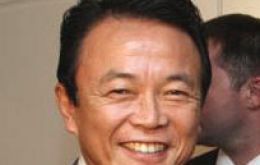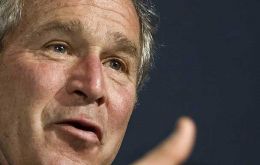MercoPress. South Atlantic News Agency
Economy
-
Friday, November 14th 2008 - 20:00 UTC
Soros forecasts “decimation” of hedge funds

Billionaire investor George Soros offered a gloomy outlook for the US economy, stating that a depression is possible. Testifying at a US Lower House Oversight and Government Reform Committee hearing on Thursday, Soros predicted that not only will the US muddle through a “deep recession,” but that hedge funds will be “decimated” by the current financial crisis.
-
Friday, November 14th 2008 - 20:00 UTC
Japan pledges 100 billion USD to boost IMF crisis fund

Japan will propose at the upcoming Group of 20 Washington summit the doubling of the current 340 billion dollars provided to the International Monetary Fund to help strengthen its capacity to address financial crises and is willing to pledge 100 billion US dollars of its reserves, according to government sources in Tokyo.
-
Friday, November 14th 2008 - 20:00 UTC
Bush defends 60 years of free-market system success

US President George W Bush has admitted the financial system needs reforming, but insists the credit crunch was not a failure of the free-market system. Speaking Thursday in New York, Mr Bush said that while financial markets did need some new regulation and more transparency, free trade should not be restricted.
-
Friday, November 14th 2008 - 20:00 UTC
High unemployment and modest 2010 upturn, SAYS OECD
Economic activity is expected to fall by 0.9% in the United States in 2009, by 0.5% in the Euro area and by 0.1% in Japan as OECD countries enter a protracted slowdown, according to latest projections.
-
Friday, November 14th 2008 - 20:00 UTC
Euro zone officially in recession; first time since 1999

The Euro-zone has officially slipped into recession after EU figures showed that the economy shrank by 0.2% in the third quarter. This follows a 0.2% contraction in the 15-nation area in the previous quarter from April to June. Two quarters of negative growth define a technical recession.
-
Friday, November 14th 2008 - 20:00 UTC
Pre G20 summit positions sees Brown line up with Bush

British Prime Minister Gordon Brown has urged leaders of the G20 developed and emerging economies to resist calls for protectionism. Speaking in New York ahead of the weekend G 20 summit on the widening global financial crisis PM Brown said protectionism was “the road to ruin”.
-
Friday, November 14th 2008 - 20:00 UTC
US October retail sales plunge but Wal-Mart's up 2.4%
United States retail sales fell 2.8% in October, the largest drop on record for the month and another sign that US consumers are clamping down amid the faltering economy, the Commerce Department reported Friday.
-
Friday, November 14th 2008 - 20:00 UTC
Deutsche Bank forecasts 3% growth for 2009 in Uruguay

Deutsche Bank anticipates a significant slowdown of the Uruguayan economy for 2009, with weakening domestic demand growth and investment plus fiscal deterioration. The German bank estimates that Uruguay's GDP will expand 10.5% in 2008 but fall back to 3% next year.
-
Thursday, November 13th 2008 - 20:00 UTC
Mercosur in “solid position” to address global crisis

Mercosur country members are in a more solid position to face the global financial crisis that rich nations, said Brazilian president Lula da Silva who nevertheless called for a stronger trade links among its members.
-
Thursday, November 13th 2008 - 20:00 UTC
Latam markets plunge on Paulson's U-turn focus change

Latinamerica's main stock markets ended sharply weaker on Wednesday following on Wall Street and US Treasury Secretary Henry Paulson's announcement that it would re focus the 700 billion US dollars bailout fund.
